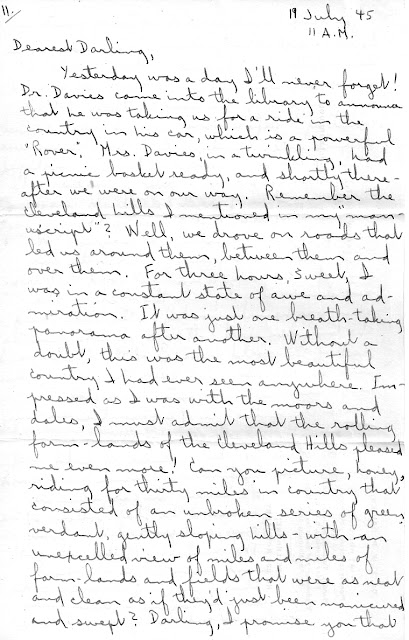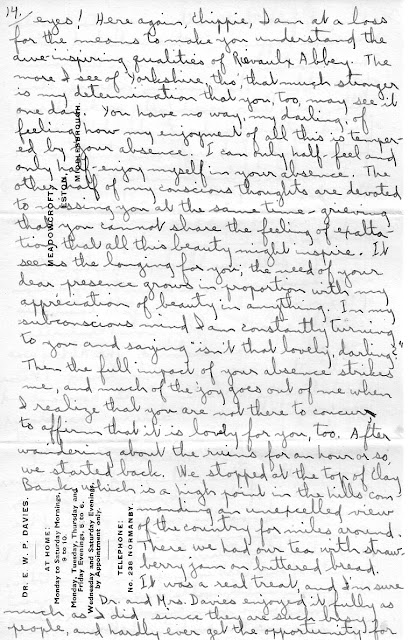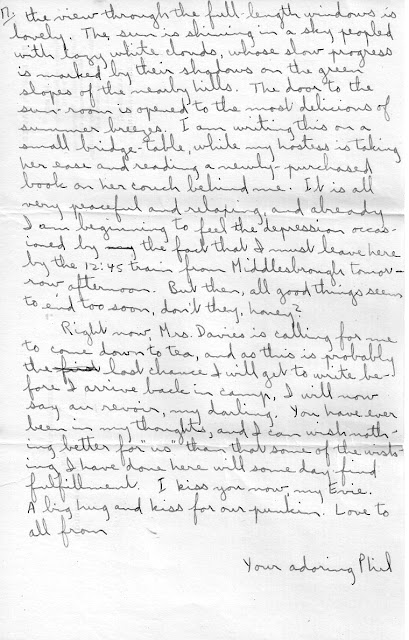11 A.M.
Dearest Darling,
Yesterday was a day I'll never forget! Dr. Davies come into the library to announce that he was taking us for a ride in the country in his car, which is a powerful "Rover". Mrs. Davies, in a twinkling, had a picnic basket ready, and shortly thereafter we were on our way. Remember the Cleveland hills I mentioned in my “manuscript"? Well, we drove on roads that led us around them, between them and over them. For three hours, Sweet, I was in a constant state of awe and admiration. It was just one breath-taking panorama after another. Without a doubt, this was the most beautiful country I had ever seen anywhere. Impressed as I was with the moors and dales, I must admit that the rolling farm-lands of the Cleveland Hills pleased me even more! Can you picture, honey, riding for thirty miles in country that consisted of an unbroken series of green verdant, gently sloping hills - with an unexcelled view of miles and miles of farm-lands and fields that were as neat and clean as if they'd just been manicured and swept? Darling, I promise you that you have never seen anything quite so lovely - either on picture post-cards, or in technicolor travelogues! Mere words of mine couldn't begin to give you a real appreciation of the fascination of this country! Before very long I was almost drunk with beauty. - But the climax was still to come. Our destination, it developed, was Rievaulx Abbey. Now, I was ever cold to the wonders of great cathedrals, imposing ruins, etc., etc., but Rievaulx Abbey, or what is left of it, is something else again. We had made a sharp right turn on the far side of a hill onto a narrow road that dropped almost sheerly into the valley. The glen was heavily wooded on the sides, and the tiny farmer's cottages, remote from the rest of the world because of the hills surrounding them on all sides, gave the place a charmingly secluded and mysterious aspect. The place reminded me of a gigantic tea cup, lined with the velvet-green of trees, grass and fern. Here, too, the “neatness" of field and lawn was the first impression one gleaned. We parked the car when we reached the flat bottom of the "cup", and proceeded on foot! The rusticity of the cottages and farm-houses was most charming, and it gave me the impression that life on these parts was quiet and changeless and unexciting. I felt that nothing important could ever have happened in this secluded vale. Then, suddenly, we came upon the ruins of the Abbey. The immense, towering, stone walls, with their beautifully sculpted and fluted gothic windows, standing about forty or fifty feet high, and stuck smack in the center of this somnolent community, all tended to make the ruins the most inspiring edifice I had ever seen. It was built on an immense scale, covering an area of a full city block, and while the walls have been worn down to a fraction of their original size, it is still easily discernible how the Abbey looked centuries ago, when it was inhabited. The Abbey was no less than 300 years in building. It was started in the 12th century by the Normans and was completed in the 15th century. The astounding thing to contemplate when viewing the great masses of stone, and the massive grace of the gothic arches, and the ornamental carving of the great supporting pillars, is where and how the builders obtained the engineering knowledge and skill necessary to construct a structure that would tax the talents of our best engineering brains today. It's simply unbelievable that men 800 years ago should have been capable of such a thing. Yet, there was the evidence before our very eyes! Here again, Chippie, I am at a loss for the means to make you understand the awe-inspiring qualities of Rievaulx Abbey. The more I see of Yorkshire, tho’, that much stronger is my determination that you, too, may see it one day. You have no no way, my darling, of feeling how my enjoyment of all this is tempered by your absence. I can only half-feel and half- enjoy myself in your absence. The other half of my conscious thoughts are devoted to missing you at the same time - grieving that you cannot share the feeling of exaltation that all this beauty might inspire. It seems the longing for you; the need of your dear presence grows in proportion with my appreciation of beauty in anything. In my subconscious mind I am constantly turning to you and saying “isn't that lovely, darling?” Then the full impact of your absence strikes me, and much of the joy goes out of me when I realize that you are not there to concur - to affirm that it is lovely for you, too. After wandering about the ruins for an hour or so, we started back. We stopped at the top of Clay Bank, which is a high point in the hills commanding an unexcelled view of the country for miles around. There we had our tea with strawberry jam on buttered bread. It was a real treat, and I'm sure Dr. and Mrs. Davies enjoyed it fully as much as I did, since they are such busy people, and hardly ever get the opportunity for an outing. I'm afraid I've cut rather deeply into both the Drs.’ and Mrs. Davies’ routines, but I can't feel guilty about it because they so obviously enjoy getting away from the grind for a bit - something they wouldn't do without the excuse I provide. When we came back to Meadowcroft, Comdr. Healey was in the library waiting our return. While Mrs. Davies busied herself with supper, and the Dr. attended a few patients in surgery, I got arguing with the Comdr. about the prosecution of war criminals. It seems we had quite opposite views on the subject, and the discussion waxed hot and heavy for a while. However, Tim Healey had the advantage of me in his knowledge of law, legal proceedings, etc., and whenever I ventured a means of dealing with the accused war criminals, he would say "but you can't do that because—,” and I was licked, you see. I must admit that while I didn't approve his methods, he did show me where my ideas were impracticable. Anyhow, we killed the time before supper this way. The subject over the table was world-politics, which was a bit over my head, but the Dr., Mrs. Davies and the Comdr. all had plenty to say, while I only butted in where I thought I had a point to make. In the library afterwards, I got the Dr. to “talking shop,” which he isn't at all averse to doing, and which I literally dote on. After Mrs. Davies retired, the subject switched to sexual erotica, which the Dr. professed not to know too much about, but which he proceeded to discourse on most entertainingly. - And the things I didn't learn~! Remind me to tell you about the Hot. Apr. sometime, Sweet. After the good Doc had talked himself out, we retired, too.
Dearest Darling,
Yesterday was a day I'll never forget! Dr. Davies come into the library to announce that he was taking us for a ride in the country in his car, which is a powerful "Rover". Mrs. Davies, in a twinkling, had a picnic basket ready, and shortly thereafter we were on our way. Remember the Cleveland hills I mentioned in my “manuscript"? Well, we drove on roads that led us around them, between them and over them. For three hours, Sweet, I was in a constant state of awe and admiration. It was just one breath-taking panorama after another. Without a doubt, this was the most beautiful country I had ever seen anywhere. Impressed as I was with the moors and dales, I must admit that the rolling farm-lands of the Cleveland Hills pleased me even more! Can you picture, honey, riding for thirty miles in country that consisted of an unbroken series of green verdant, gently sloping hills - with an unexcelled view of miles and miles of farm-lands and fields that were as neat and clean as if they'd just been manicured and swept? Darling, I promise you that you have never seen anything quite so lovely - either on picture post-cards, or in technicolor travelogues! Mere words of mine couldn't begin to give you a real appreciation of the fascination of this country! Before very long I was almost drunk with beauty. - But the climax was still to come. Our destination, it developed, was Rievaulx Abbey. Now, I was ever cold to the wonders of great cathedrals, imposing ruins, etc., etc., but Rievaulx Abbey, or what is left of it, is something else again. We had made a sharp right turn on the far side of a hill onto a narrow road that dropped almost sheerly into the valley. The glen was heavily wooded on the sides, and the tiny farmer's cottages, remote from the rest of the world because of the hills surrounding them on all sides, gave the place a charmingly secluded and mysterious aspect. The place reminded me of a gigantic tea cup, lined with the velvet-green of trees, grass and fern. Here, too, the “neatness" of field and lawn was the first impression one gleaned. We parked the car when we reached the flat bottom of the "cup", and proceeded on foot! The rusticity of the cottages and farm-houses was most charming, and it gave me the impression that life on these parts was quiet and changeless and unexciting. I felt that nothing important could ever have happened in this secluded vale. Then, suddenly, we came upon the ruins of the Abbey. The immense, towering, stone walls, with their beautifully sculpted and fluted gothic windows, standing about forty or fifty feet high, and stuck smack in the center of this somnolent community, all tended to make the ruins the most inspiring edifice I had ever seen. It was built on an immense scale, covering an area of a full city block, and while the walls have been worn down to a fraction of their original size, it is still easily discernible how the Abbey looked centuries ago, when it was inhabited. The Abbey was no less than 300 years in building. It was started in the 12th century by the Normans and was completed in the 15th century. The astounding thing to contemplate when viewing the great masses of stone, and the massive grace of the gothic arches, and the ornamental carving of the great supporting pillars, is where and how the builders obtained the engineering knowledge and skill necessary to construct a structure that would tax the talents of our best engineering brains today. It's simply unbelievable that men 800 years ago should have been capable of such a thing. Yet, there was the evidence before our very eyes! Here again, Chippie, I am at a loss for the means to make you understand the awe-inspiring qualities of Rievaulx Abbey. The more I see of Yorkshire, tho’, that much stronger is my determination that you, too, may see it one day. You have no no way, my darling, of feeling how my enjoyment of all this is tempered by your absence. I can only half-feel and half- enjoy myself in your absence. The other half of my conscious thoughts are devoted to missing you at the same time - grieving that you cannot share the feeling of exaltation that all this beauty might inspire. It seems the longing for you; the need of your dear presence grows in proportion with my appreciation of beauty in anything. In my subconscious mind I am constantly turning to you and saying “isn't that lovely, darling?” Then the full impact of your absence strikes me, and much of the joy goes out of me when I realize that you are not there to concur - to affirm that it is lovely for you, too. After wandering about the ruins for an hour or so, we started back. We stopped at the top of Clay Bank, which is a high point in the hills commanding an unexcelled view of the country for miles around. There we had our tea with strawberry jam on buttered bread. It was a real treat, and I'm sure Dr. and Mrs. Davies enjoyed it fully as much as I did, since they are such busy people, and hardly ever get the opportunity for an outing. I'm afraid I've cut rather deeply into both the Drs.’ and Mrs. Davies’ routines, but I can't feel guilty about it because they so obviously enjoy getting away from the grind for a bit - something they wouldn't do without the excuse I provide. When we came back to Meadowcroft, Comdr. Healey was in the library waiting our return. While Mrs. Davies busied herself with supper, and the Dr. attended a few patients in surgery, I got arguing with the Comdr. about the prosecution of war criminals. It seems we had quite opposite views on the subject, and the discussion waxed hot and heavy for a while. However, Tim Healey had the advantage of me in his knowledge of law, legal proceedings, etc., and whenever I ventured a means of dealing with the accused war criminals, he would say "but you can't do that because—,” and I was licked, you see. I must admit that while I didn't approve his methods, he did show me where my ideas were impracticable. Anyhow, we killed the time before supper this way. The subject over the table was world-politics, which was a bit over my head, but the Dr., Mrs. Davies and the Comdr. all had plenty to say, while I only butted in where I thought I had a point to make. In the library afterwards, I got the Dr. to “talking shop,” which he isn't at all averse to doing, and which I literally dote on. After Mrs. Davies retired, the subject switched to sexual erotica, which the Dr. professed not to know too much about, but which he proceeded to discourse on most entertainingly. - And the things I didn't learn~! Remind me to tell you about the Hot. Apr. sometime, Sweet. After the good Doc had talked himself out, we retired, too.
This morning Mrs. Davies woke me at 8:30, whereupon I hopped out of bed and made straight for the bath-room and a good, hot bath. After shaving, and a change of clothes, I felt fit and fresh and ready for anything. “Anything” proved to be a solitary breakfast (Mrs. Davies had already had hers) with a newspaper, after which I settled down in the library to start on today's installment. I wrote until lunch time, when Mrs. Davies took me into Middlesbrough for lunch. She is still very desirous of managing a visit to the States, and we discussed it at length over her lamb-chops and my roast beef. She also wanted to know if I couldn't arrange for her to receive the “Womens’ Home Companion" and "Ladies' Home Journal", or some similar women's magazines. I told her that you should be able to do that for her. Can you, honey? Tell me what the cost of a year's subscription to one or both would be, and I'll make her a gift of the subscriptions. After our meal, she stopped to shop for a few things and then came back here. She suggested that we take advantage of the perfectly glorious weather in the sun-room. The sun-room overlooks the Meadowcroft gardens, and the view through the full-length windows is lovely. The sun is shining in a sky peopled with lazy white clouds, whose slow progress is marked by their shadows on the green slopes of the nearby hills. The door to the sun-room is opened to the most delicious of summer breezes. I am writing this on a small bridge-table, while my hostess is taking her ease and reading a newly-purchased book on her couch behind me. It is all very peaceful and relaxing, and already I am beginning to feel the depression occasioned by the fact that I must leave here by the 12:45 train from Middlesbrough tomorrow afternoon. But then, all good things seem to end soon, don't they, honey?
Right now, Mrs. Davies is calling me to came down to tea, and as this is probably the last chance I will get to write before I arrive back in camp. I will now say au revoir, my darling. You have ever been in my thoughts, and I can wish nothing better for “us” than that some of the wishing I have done here will some day find fulfillment. I kiss you now, my Evie. A big hug and kiss for our punkin. Love to all from
Your adoring Phil
Your adoring Phil







